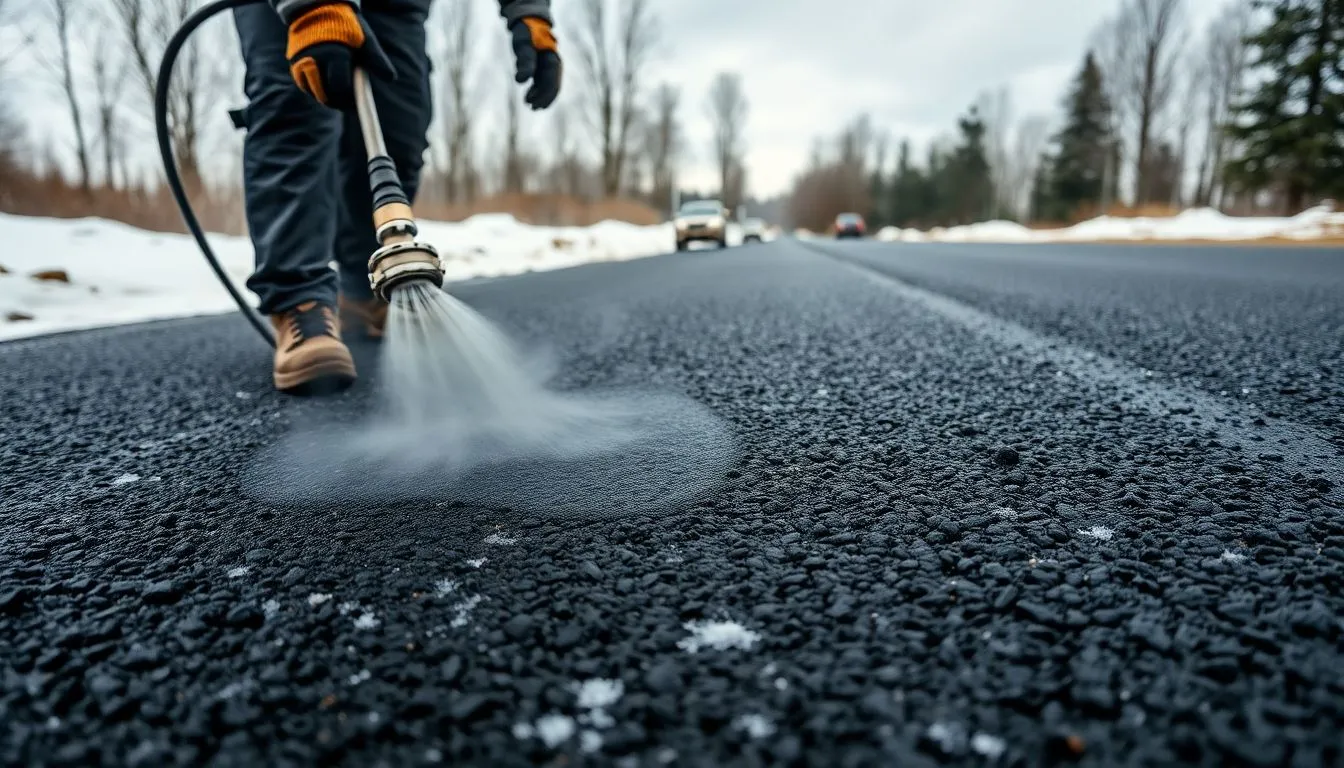Sealing asphalt is always a smart investment—but sealing in cold weather? That’s a whole different game. Cold temperatures, moisture, and frost can make ordinary sealers less effective and shorten their life. Choosing the best asphalt sealer for cold weather ensures your pavement stays strong, flexible, and crack-free—even through the harshest winters.
This expert guide will walk you through everything you need to know: from the science behind cold-weather sealing to product recommendations, application tips, and professional maintenance strategies.
Best Asphalt Sealer for Cold Weather
Why Cold Weather Sealing Matters for Asphalt
In cold climates, your asphalt faces extreme challenges: temperature fluctuations, snow, salt, and constant freeze-thaw cycles. These conditions accelerate deterioration, especially if your pavement is left unprotected.
📊 Research shows that untreated asphalt might break down up to 50% faster in the winter.
When water enters small cracks and freezes, it expands, widening the damage. A quality cold-weather asphalt sealer locks out moisture, fills micro-cracks, and adds a protective layer that resists winter wear.
Key Factors to Consider When Choosing a Cold-Weather Asphalt Sealer
🔥 1. Low-Temperature Application Compatibility
Most sealers need to be applied at a temperature of at least 50°F (10°C). Applying below that can lead to poor adhesion and ineffective sealing. Choose sealers that:
-
Cure properly at 40°F or lower.
-
They are labeled “cold-pour” or “cold-weather formula.”
🌧️ 2. Weather Resistance & Moisture Tolerance
Winter sealing means dealing with humidity, frost, and surprise snow. Select sealers that:
-
Resist moisture during application.
-
Withstand freeze-thaw cycles without cracking.
-
Offer early water resistance (e.g., within 4–6 hours).
⚗️ 3. Sealer Composition
Two main types dominate the market:
| Sealer Type | Pros | Cons |
|---|---|---|
| Coal Tar-Based | Strong chemical resistance, durable, ideal for heavy use | Harsh odor, environmental concerns |
| Asphalt Emulsion | Eco-friendly, easier to apply in cold weather | Slightly less durable than coal tar |
If environmental safety matters, opt for asphalt emulsion. Coal tar sealers are stronger for use in industry.
🧱 4. Flexibility and Crack-Bridging
Winter causes asphalt to expand and contract. Your sealer must:
-
Stay elastic even in freezing temps.
-
Stretch and shrink with the pavement to prevent cracking.
Look for sealers labeled “flexible,” “elastomeric,” or “crack-bridging.”
⏱️ 5. Fast Curing Time
Cold slows drying. Choose quick-drying sealers that:
-
Cure within 24 hours, even in 40–50°F weather.
-
Reduce downtime for driveways and parking lots.
Top 3 Best Cold Weather Asphalt Sealers (Reviewed)
✅ 1. Black Jack Cold-Pour Patch & Sealer
-
Type: Asphalt Emulsion + Cold-Pour Tech
-
Min. Temp: 40°F (4°C)
-
Pros: Quick cure time, weatherproof, easy DIY application
-
Cons: Slightly more expensive
-
Ideal for: Cold regions with frequent freeze-thaw cycles
-
Where to Buy: Black Jack website or Home Depot
✅ 2. Gardner® DriveSeal Asphalt Sealer
-
Type: Asphalt Emulsion
-
Min. Temp: 50°F
-
Pros: Excellent moisture resistance, dries in 24 hours, good elasticity
-
Cons: Not suitable for temperatures below 40°F
-
Ideal for: Residential driveways
-
Where to Buy: Gardner-Gibson or Lowe’s
✅ 3. SealMaster® Coal Tar Sealer
-
Type: Coal Tar
-
Min. Temp: 50°F
-
Pros: Chemical-resistant, commercial-grade durability
-
Cons: Harsh smell, not eco-friendly
-
Ideal for: Commercial lots or industrial use
-
Where to Buy: SealMaster Locations
Additional Cold Weather Asphalt Repair Products
| Product | Use Case | Temp Range | Highlights |
|---|---|---|---|
| Tuff Seal Cold-Pour Crack Filler | Filling deep cracks | 50°F+ | Quick-drying, flexible |
| Tex-x Instant Cold Patch | Pothole repair | 32°F+ | Ready-to-use, no heating required |
Pro Tips: How to Apply Asphalt Sealer in Cold Weather
✅ Prep Right
-
Remove dirt, oil, and loose debris.
-
Clean with a pressure washer for better adhesion.
✅ Mind the Weather
-
Avoid rainy or windy days.
-
Only seal if temperatures remain above 40°F for 24 hours.
✅ Timing is Key
-
Seal late morning to mid-afternoon when temps peak.
-
Avoid evening applications—cooling temps slow curing.
✅ Application Tools
-
Use sealcoating brushes or rollers.
-
If spraying, ensure the product is labeled for cold-weather spray.
✅ Post-Seal Care
-
Block off the area for 24–48 hours.
-
Avoid snowplows or salting until the sealer fully cures.
Maintenance Tips for Winter-Proof Asphalt
Keeping your pavement protected doesn’t stop after sealing:
🧹 Routine Maintenance:
-
Inspect for new cracks each season.
-
Sweep off salt and debris weekly.
🛠 Crack Filling:
-
Use cold-weather crack fillers immediately to stop water entry.
🔁 Resealing:
-
Every 2–3 years or after major winter exposure.
🧊 De-Icing:
-
Calcium magnesium acetate is an example of a safe, non-corrosive ice melt.
Conclusion: Protect Your Asphalt Year-Round
Sealing your pavement with the right cold-weather asphalt sealer isn’t just about appearances—it’s about long-term protection, safety, and cost savings. The best sealers cure at lower temps, resist moisture, and stay flexible through tough winters.
With products like Black Jack Cold-Pour, Gardner DriveSeal, or SealMaster Coal Tar, and careful application, your asphalt will survive and thrive—no matter how icy the weather gets.

